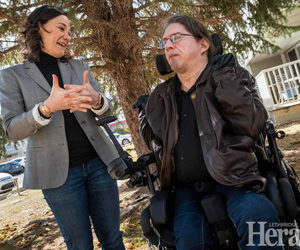Disabled man says AHS self-care management forms dehumanizing
By Lethbridge Herald on March 6, 2020.
 Lethbridge-West MLA Shannon Phillips talks with Ryan Gerstenbuhler about concerns regarding the Self Managed Care program, Friday, outside of Gerstenbuhler's apartment. Herald photo by Ian Martens @IMartensHerald
Lethbridge-West MLA Shannon Phillips talks with Ryan Gerstenbuhler about concerns regarding the Self Managed Care program, Friday, outside of Gerstenbuhler's apartment. Herald photo by Ian Martens @IMartensHeraldTim Kalinowski
Lethbridge Herald
tkalinowski@lethbridgeherald.com
A local man says new self-care management forms being issued to those with serious disabilities in Lethbridge by Alberta Health Services are dehumanizing and, at heart, a cynical attempt to justify provincial government benefit cuts to people with disabilities.
Ryan Gerstenbuhler, a quadriplegic with spasmic cerebral palsy who has lived in his own home for the past 12 years by employing a live-in caregiver through Alberta’s Self-Managed Care Program, says his words should be a wake-up call that something is badly amiss with the current provincial government’s approach to those with long-term disabilities like himself.
“Ask yourselves,” he says: “How you would feel if someone came into your home with a form and very politely asked you to account, down to the minute or the second, how long it takes you to go to the bathroom? That includes removing your clothes, using the bathroom, evacuating your bowels or your bladder completely, cleaning up after yourself, or having someone else do it for you, and putting your clothes back, your pants, or whatever. That is what this form is about.”
“It allots a certain amount of time, based on standard and performance times, that are enforced within facilities, elder care, assisted living, extended care, what have you. This form is taking my life, as an everyday citizen, and is taking my home, my apartment, and is defining it as a facility, no longer a private residence. It is interesting to note, over the last few years, it seems the movement toward integration of the disabled is going backwards.”
Gerstenbuhler gives another example from the form he has been forced to fill out to justify receiving the money he does for self-care management. He says the form only allows his assistant to take 20 minutes to fully prepare and serve him a meal.
“I ask everyone out there listening to me: What can you prepare in 20 minutes? Can you prepare a chicken dinner? No. Can you prepare a roast beef dinner? No. What you can prepare is Kraft dinner and Ichiban noodles and basic things that you boil. Which is exactly the diet I am supposed to have (according to this form).”
Gerstenbuhler says he knows of people in Lethbridge who have already had their self-managed care funding cut back under the current AHS accountability protocols, and he is fearful the same might happen to himself and others who receive home care and self-care benefits in the region.
“The cuts, or modifications as they say, began last year when they began to standardize the way you report your expenses every month for self-managed care,” he says. “When this form arrived, what I was told by an AHS official, is the goal of the form is to standardize home care across the entire South Region. What they are trying to do is make it so everyone gets the same amount of support and care. The problem with that when they use the word ‘standardized’ what they are actually doing is turning home care and self-managed care recipients into dough that is on an assembly line, and is being pounded out with a cookie-cutter. Where everyone looks the same, everyone has the same needs, everyone has the same disability, and benefits and assistance are issued out as though everyone is the same. There is no room for individuality.
“And my needs are obviously very different from someone who has MS or some other condition, but these forms not only pigeon-hole your life, but they also try to turn you into, rather than a human, into a clone. What these forms effectively have done is turn me into a potted plant, and my caregiver into a robot because he has to complete these tasks within a certain length of time.”
For those on self-managed care facing benefit cuts, without having any other additional family supports, the result can only go one way, says Gerstenbuhler.
“The net result of not having adequate supports or having your funding cut back, when you rely on an assured income for the severely handicapped, when you rely on home care, when you rely on persons with development difficulties’ programs, the ultimate result, the only option you have, is institutionalization. If they reduce my funding, if they take it away, the net result for me, and for just about anybody else who doesn’t have friends or family who can assist you, is institutionalization.
“And that should frighten everybody.”
Gerstenbuhler elaborates further on this point.
“The reality is people are living longer, and we have a whole generation on the cusp of retirement,” he says. “When that generation begins to access resources, if the government thinks there is a crunch now — it has no idea. So anyone who thinks that these issues do not affect them, they are wrong. In five to 10 years, it might. The reason why sometimes people are not aware of these issues are going on is you are not aware of something like self-managed care or home care, St. Mike’s health-care centre, or any other kind of service, until it affects you. Or someone that you love and care about.”
“And there is one thing we all have in common, disabled or non-disabled,” he adds, “eventually at some point in (your lives), in some way, you will be relying on the system or a system just the way I do.”
Follow @TimKalHerald on Twitter
-1




